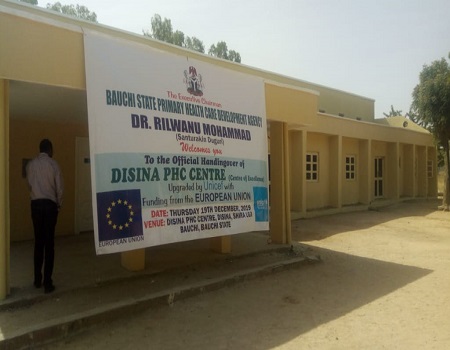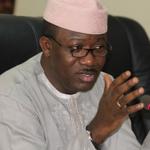In fulfilling the mandate of ensuring child survival, development and protection of the rights of children as given by the UN General Assembly in 1946, UNICEF is collaborating with the Bauchi State Government, other UN Agencies, NGOs and partners in assisting the State Government to improve the lives of children and women.
This disclosure was made by UNICEF Chief of Field, Bauchi Field Office, Bhanu Pathak on Thursday saying that Over the years, UNICEF has been partnering with Bauchi State government in the key sectors of Health; Nutrition; Water, Sanitation and Hygiene; Basic Education and Child Protection.
Speaking during the handing over of one of renovated PHCs in Shira LGA, Bhanu Pathak explained that In 2017, UNICEF’s support to Bauchi State was bolstered by the 54-million-euro funding UNICEF received from the European Union (EU) to support Bauchi, Adamawa and Kebbi States to implement healthcare services under the project titled, Strengthening Primary Health Care and Community Resilience for Improved Maternal, New-born, Child Health & Nutrition (MNCHN) Outcomes in three Northern States of Nigeria.
ALSO READ: Insecurity: FG urged to restructure security architecture
Represented by UNICEF Nutrition Officer, Dr Jackson Martins, the Chief of Field Office said that In Bauchi state, the project which is currently in its third year of implementation has recorded many achievements which include 34 PHCs out of 108 earmarked for renovation have been completed to improve infrastructure in the health sector, with 32 previously handed over and 2 more to be handed over; while renovation work is on-going on the others.
He added that Standard equipment has been supplied to all 323 main PHCs in the state (1 PHC per ward) with 245 approved as functional 24 hours, 7 days a week. Despite the supply of equipment, not all are functional 24 hours due to other factors such as inadequate staff.
Also done by UNICEF is Free commodities supplied to the main PHCs to ensure free treatment for all under 5-year-old children; free Ante-natal Care (ANC), hospital deliveries and post-natal care (PNC), including screening of every pregnant woman for HIV; and providing the ones confirmed positive with Antiretroviral drugs to prevent mother-to-child transmission.
45 health workers (Nurses/midwives, Community Health Extension Workers, CHEWs; Junior Community Health Extension Workers, JCHEWs), record officers and volunteers have been engaged and are visiting hard-to-reach (HTR) communities that find it difficult to access standard health care services in the PHCs in 9 LGAs (Alkaleri, Bauchi, Toro, Ningi, Ganjuwa, Misau, Katagum, Zaki and Gamawa) to provide several integrated services including ANC, PNC, management of labour and deliveries of pregnant women, immunisation, nutritional screening, screening and treatment of common childhood illnesses (Malaria, Pneumonia, and Diarrhoea diseases) and treatment of common ailments.
Also, the 9 teams in the LGAs have attended to over 90,900 under 5 children and over 8,500 pregnant women who all benefitted from one or more of the integrated services being provided.
1,200 volunteer Community Oriented Resource Persons (CORPs) have been trained on Integrated Community Case Management (ICCM) of common childhood illnesses (Malaria, Pneumonia, and Diarrhoea disease) with guidelines/protocols to follow to continually deliver treatment of these illnesses in their various HTR communities.
These volunteers who cover 1,200 settlements are from the settlements they cover and reside in these settlements. They are kitted with tools and commodities necessary for easy diagnosis and treatment of children aged 2 months to under-5 years (59 months) and were also trained to refer conditions with danger signs that are beyond what they have been assigned to treat.
Health workers from the main PHC in each ward where the CORPs operate have also been trained and empowered to supervise the CORPs monthly which is also a strategy to bridge the gap of easy access to PHCs by those HTR communities while all treatment is free.
He disclosed that So far, the CORPs have seen and attended to over 93,000 under 5-year children; and treated over 68,000 for malaria, diarrhoea, and pneumonia in those HTR settlements.
According to him, Community-based Management of Acute Malnutrition (CMAM) centres supported by UNICEF was one of the interventions of UNICEF in the state before the coming EU-UNICEF MNCHN project which was previously in only 3 LGAs (Kirfi, Katagum and Dambam) before the commencement of the EU-funded project but has now been scaled up to 9 LGAs under the EU project with additional 6 LGAs (Bauchi, Darazo, Gamawa, Itas Gadau, Tafawa Balewa, and Warji). This has led to screening, admission, and successful treatment of 91.4% of over 24,000 severely malnourished children in the 6 EU-UNICEF funded CMAM sites.
The EU-UNICEF also provides micronutrient powder (MNP) to 6-23 months old children in the state, especially through the CMAM sites to prevent malnutrition; and has since commencement in the second quarter of 2018, reached 84,482 children aged 6-23 months with MNP covering 168% of the project target.
The project also engaged the services of sixty (60) Clinical Mentors (Doctors and Midwives from General Hospitals) and the LGA Maternal Child Health Coordinator (MCH) in all LGAs to visit all main PHCs in each LGA to continually mentor the health workers to ensure quality of care while 212 Motorcycles have been supplied to selected main PHCs to help the health workers carry out outreach integrated services to distant settlements.
Conditional Cash Transfer (CCT), a Social Protection Program (SPP), is being implemented in 3 LGAs (Bauchi, Katagum and Misau) where a pregnant woman is enrolled into ANC and given transport fare of N1,000 in each of her recommended 4 ANC visits; N4,000 when she delivers in the health facility and child receives first immunisation vaccines, and N1,000 in each of the next 4 immunisation schedules for the child.
These amount to a total of N12,000 for one woman from pregnancy stage, through delivery, to fully immunised stage of the infant. This strategy is designed to bridge the gap of financial barriers hindering pregnant women in remote communities from attending ANC; delivering in the hospital or fully immunising their children against preventable diseases. Over 3,500 women have benefitted from the scheme in the 3 supported PHCs.
The project has also supported the state through National Population Commission (NPopC) and the Bauchi State Primary Health Care Development Agency (SPHCDA) to conduct Birth Registration (BR) of children through mass campaigns and through routine BR at the PHC levels. So far, over 1,420,000 under 5-year children have been registered and received BR certificates.
He declared that, as UNICEF hands over the 33rd (Disina PHC, Shira LGA) and 34th (Ari PHC, Ningi LGA) which are two (2) of the twenty (20) centres of excellence renovated under the EU project, UNICEF calls on the beneficiary communities and the state government to ensure that these facilities are not only protected but are utilised by the community to make a difference in the health outcomes of children and women.
As the project comes to an end in 2020, UNICEF would also like to call on the Bauchi State government to initiate action that would ensure the sustainability of this multi-sectoral health intervention that has no doubt been of benefit to the good people of Bauchi State, he appealed.
Bhanu Pathak said, “UNICEF expresses deep appreciation to our donor, the EU, for providing the funds for this project. UNICEF would also like to say a big thank you to the community, health facility staff and the contractors who partnered and spent time overseeing and ensuring quality work was done in the designated areas”.
He concluded by saying, “Let me conclude by reiterating that UNICEF will continue to fulfil its obligations in the partnership with Bauchi State government; and will support the state to implement programmes that help the State attain the global Sustainable Development Goals (SDGs) in the various sectors of our collaboration”.
While receiving the renovated PHC, the Executive Chairman of the Bauchi State Primary Health Care Development Agency, Dr Rilwanu Mohammed, said that the health facility will help to reduce maternal and child deaths in Bauchi State.
The Executive Chairman also said that Bauchi State government has declared a state of emergency in the health, education and agricultural sectors to give priority attention to the sectors. He urged the people of Disina to put the facility to good use while ensuring its safety.
While commending the EU-UNICEF for renovating the facility, he said that the state government will recruit nurses and midwives to man the renovated PHCs to address the challenge of inadequate staff.
Deputy Chairman of Shira LGA, Mahmud Abba, representing the LGA chairman, Maigari Mohammed Khanna expressed appreciation to EU, UNICEF and the state government for renovating the health facility.
The District Head of Disina, Alhaji Abdullahi Mustapha, during his vote of thanks, spoke in a similar vein, assuring that the people of Disina were full of thanks to EU and UNICEF for the renovated health facility and will take good care of it.





